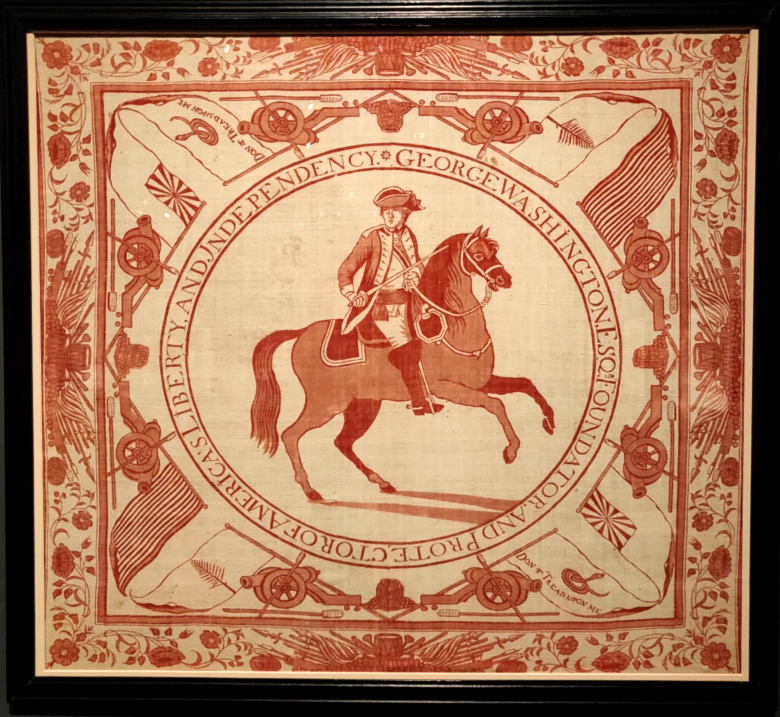A Crisis of Peace: George Washington, the Newburgh Conspiracy, and the Fate of the American Revolution by David Head (New York: Pegasus Books, 2019)
Students of the Revolution are likely already familiar with the tale of George Washington winning over a group of disgruntled officers at war’s end through strategic use of his eyeglasses and a heart-tugging reminder that he grew old and blind in the service of his country. The events leading up to this commonly lauded occasion have often been constructed as a possible conspiracy between nationalists in Philadelphia and the army officers encamped at Newburgh, although the exact details remain murky. However, in A Crisis of Peace: George Washington, The Newburgh Conspiracy, and the Fate of the American Revolution, David Head reconsiders the Newburgh Conspiracy’s events and evaluates evidence within the context of eighteenth-century society as well as the context of interpersonal relationships to dismantle scholarly misinterpretations and provide a more complete portrayal of the events surrounding the so-called conspiracy and its aims.
While the events that transpired are something of a mystery, Head systematically pieces together evidence to tackle the big questions of the conspiracy, including the conjectured involvement of individuals such as Alexander Hamilton, James Madison, and Robert Morris in stirring up disgruntled army officers. Head places events and correspondences within the context of the latest stages of the war as well as the types of language and social norms that informed activities in the eighteenth century. While the battle of Yorktown and official surrender are thought of sequentially—which is, after all, technically true—the rather extended timeframe between the events is often glossed over, minimizing the many things in flux during this period. Prior to official peace, British troops remained in possession of several important cities and the young government faced crippling debt and struggled to find ways to pay it—a task made more difficult by states that refused to cooperate with Congress and each other. Meanwhile, many months without military campaigns left officers restless and waiting for their pensions while dealing with an unsupportive civilian population. Head provides a valuable reminder that viewing things in hindsight is always twenty-twenty; to modern readers the surrender is the obvious conclusion to the Battle of Yorktown, but contemporaries did not live with that certainty.
In addition to placing events within the context of the drawn out and uncertain end of the war, Head also demonstrates how eighteenth-century society assumed conspiracies to explain events. Contemporary social patterns of thought primed soldiers and civilians alike for suspicion. In a society that blended together philosophical and religious thinking, people grappled for explanations of their opponents’ actions. This created a complicated web of conspiratorial thinking. Officers perceived a lack of support from civilians as a purposeful attempt to dishonor them, while civilians feared that officers’ demands for pay indicated a desire for power and control in the new republic.
It was during this drawn out period of downtime—with officers becoming restless, bored, and increasingly disgruntled about Congress’s delay in fulfilling pay—that a letter from an army officer circulated calling for the army to defy orders. Given the conspiratorial mindset of the eighteenth century, practically everyone involved in the events in Newburgh convinced themselves that it had to be some sort of plot against them: soldiers thought civilians and Congress plotted against them, while politicians assumed that they were being plotted against. Contemporarily, then, there are many assertions of conspiratorial activity between nationalist-minded politicians, who favored a bigger government, and disgruntled officers. Despite the use of language describing conspiracies, Head dissents by placing them within context. While the sources that are available concerning the events are full of accusations of a plot, Head provides a thorough and convincing argument that when the sources are read through the lens of the conspiratorial-prone mindset of the eighteenth century and further analyzed by stripping away modern conceptions of the meaning and usage of words, this evidence is more a portrayal of how people interacted during this time period rather than an actual conspiracy. The nationalist politicians who contributed to the events did so more unknowingly than intentionally.
The author additionally dismantles the notion that Hamilton and Gates participated as a way to undermine George Washington, a notion that has been advocated particularly in light of the strained relationships between the men. Hamilton’s own falling out with Washington as well as Gates’ previous involvement with the Conway Cabal typically colors scholars’ perceptions of the two men’s respective actions during these later events. However, Head provides ample evidence that the men were not part of a conspiracy. Drawing upon personal correspondences, Head not only does not find evidence that they were conspirators, but in fact refutes claims of implication by providing evidence that their interest lay elsewhere. For instance, in the case of Gates, Head finds in his personal correspondence that rather than plotting against Washington or stirring up old strife, Gates’ chief desire was to go home and see his ailing wife.
The book provides a balanced view of George Washington’s strengths as a leader and administrator. Head recognizes Washington’s weaknesses, including his tendency to fixate on certain details or goals—potentially at the expense of other matters—as well as difficulty in making rapid fire decisions in tense situations. His strength lay in his administrative ability and his knowledge of his army and how they operated. The Newburgh Conspiracy provided him with an opportunity to turn his men’s attachments back to him through his dramatic rendering of the feebleness wrought upon his vision through his service to the new country. It is this moment that has been immortalized, not only as an example of his men’s devotion, but of Washington’s ability to strategically use words and actions to bring about the desired outcome. Through these strategic displays and wisely chosen words, Washington demonstrated his strengths as a leader.
This work is written in a flowing and engaging style that is accessible and yet maintains rigorous standards for scholarship. Head writes with a sense of humor that is sure to bring some extra delight to readers. For anyone interested in the end of the war and the social, political, and economic factors of the time, this book is a must read.
BUY THIS BOOK FROM AMAZON
(As an Amazon Associate, JAR earns from qualifying purchases. This helps toward providing our content free of charge.)









2 Comments
Thanks for the review, I will be checking this work out.
Also worthy mentions on the subject are Joe Ellis’s “The Quartet” chapter regarding Hamilton (which goes into some detail about Hamilton and Morris’ problems with the Confederation Congress), and Dave Richards’s “Swords in Their Hands.”
Washington “difficulty making decisions in rapid fire decisions in tense situations.” Hmm. Battle of Monmouth . . . Lee has just botched the attack on the British rearguard and the battle hardened Brits are smashing back. Washington instantly organizes the defense which stops the enemy advance and battles back in a complicated battlefield and wins the battlefield. Hmm. Battle of Princeton . . . British troops rushing south are cutting up enfiled Continental troops heading north. Washington rides up and instantly organizes the men and defeats the enemy troops.